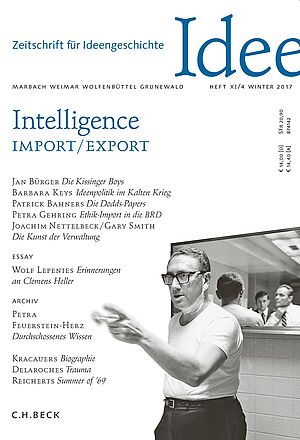
Petra Gehring, Dr. phil.
Professor of Philosophy
Technical University of Darmstadt
Geboren 1961 in Düsseldorf
Studium der Philosophie, Politikwissenschaft und Rechtswissenschaften
an den Universitäten Gießen, Marburg und Bochum
Project
"Life": Elements of the History and Metaphysics of an Enigmatic Concept
Angestrebt wird eine Rekonstruktion der historischen Diskurse von "Leben", welche die natur- und sozialwissenschaftlichen Dimensionen des Konzeptes und die philosophische Begriffsgeschichte zueinander ins Verhältnis setzt. Dabei werden neben der Zeit um 1800 - unstreitig die take off-Phase desjenigen quasi-stofflichen Lebensbegriffs, der die Modellierung biologischer, anthropologischer und biomedizinischer Sachverhalte grundiert - vor allem auch die Epochenschwelle um 1900 und aktuelle Biopolitik-Diskussionen von Interesse sein. Hier richten sich Arbeitsfragen (a) auf die juridischen Fassungen von "Leben" und "Lebenswert" in der (rechts)politischen Reformliteratur vor und um 1900, (b) auf "Leben" und "Lebensqualität" in deutschsprachigen Diskursen in der Sozialethik und Sozialpolitik nach dem Zweiten Weltkrieg, (c) auf angelsächsisch-deutsche Wechselwirkungen der Begriffe life/Leben und auf die interdisziplinäre Entstehungsgeschichte der Programmatik von Life Sciences bzw. Lebenswissenschaft(en) und (d) auf ausgewählte Aspekte einer Metapherngeschichte des Lebens.Lektüreempfehlung
Gehring, Petra. Theorien des Todes: zur Einführung. Hamburg: Junius Verlag, 2010.
-. Traum und Wirklichkeit: Zur Geschichte einer Unterscheidung. Frankfurt/ Main und New York: Campus, 2008.
-. Was ist Biomacht? Vom zweifelhaften Mehrwert des Lebens. Frankfurt/Main und New York: Campus, 2006.
Colloquium, 07.01.2011
Life: The History and Metaphysics of a Slippery Term
Life is a big word, often used, seldom defined, and at home when applied to an extremely broad range of objects. "Life" is a difficult case also for the history of science, the history of ideas, and the history of concepts. Sometimes the term means an empirical state of affairs; in such cases, natural-scientific models or forms of social-scientific observation or evaluation stand behind the expression. But sometimes the term also means something that eludes measuring observation - from the one, non-interchangeable life that an individual leads (and which we experience as "our" life), through the vibrancy of a work of art, to the "good life" of ethics (i.e., life as it could or should be). We are also familiar with the fact that "science" and "life" can be set in opposition to each other: life then functions as the epitome of the new, the wild, of what bursts rigid orders of understanding. We associate it with acting, deciding, and quite generally with change: life is the reality in which everything can still turn out differently from what science thinks.
My investigation starts with the time around 1800, when not only chemistry and biology arose, but also a new, natural-substance-oriented concept of life, which joins the much older narrative concept of life so close to everyday events. This new concept (with physiology, population research, cellular and evolutionary biology, genetics, etc.) becomes the real "scientific" model case of life.
In my lecture, I would like to touch on how the history of the scientific concept of life, in the 19th and 20th centuries and to this day, nonetheless cannot be grasped as a history of a primarily "biological" life. Rather, concepts of the moral and social life manifested in action, will, and other forms of life manifesting themselves, always run parallel to the more narrowly natural-scientific line of thinking about life and create interferences.
From this perspective, the state of discourse "around 1900" presents an important cutoff point. Here, at the latest, a continuum concept of life - closely tied to the terms "reality" and "value" - replaces the remnants of the Romantic core difference between "nature" and "mind" or "culture". Against this backdrop, my project investigates the formation of the life sciences in the second half of the 20th century and how the conceptuality of life can be characterized "around 2000". The lecture limits itself to a few considerations and ends with speculations on what makes the term "life" so protean and the discourse on life so stable.
Publications from the Fellow Library
Gehring, Petra (Berlin, 2025)
Biegsame Expertise : Geschichte der Bioethik in Deutschland
Gehring, Petra (2016)
Archivprobleme : Petra Gehring
Gehring, Petra (2012)
Wozu braucht Public Health Ethik - und umgekehrt?
Gehring, Petra (Zürich, 2012)
Parrhesia : Foucault und der Mut zur Wahrheit [Thesen]
Gehring, Petra (2011)
Die Kränkung der Venus : Astronomie zwischen Wissenschaftsgeschichte und Astronoetik
Gehring, Petra (2011)
Gehring, Petra (Milano, 2011)
Wie Phänomenologie interveniert
Gehring, Petra (2011)
Gehring, Petra (2011)
Ort und Orientierung - zur Einleitung












